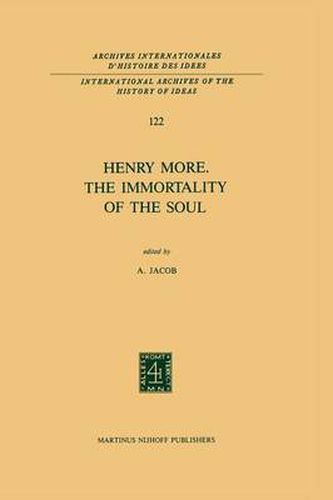Readings Newsletter
Become a Readings Member to make your shopping experience even easier.
Sign in or sign up for free!
You’re not far away from qualifying for FREE standard shipping within Australia
You’ve qualified for FREE standard shipping within Australia
The cart is loading…






This title is printed to order. This book may have been self-published. If so, we cannot guarantee the quality of the content. In the main most books will have gone through the editing process however some may not. We therefore suggest that you be aware of this before ordering this book. If in doubt check either the author or publisher’s details as we are unable to accept any returns unless they are faulty. Please contact us if you have any questions.
The significance of Henry More’s vitalist philosophy in the history of ideas has been realized relatively recently, as the bibliography will reveal. The general neglect of the Cambridge Platonist movement may be attributed to the common prejudice that its chief exponents, especially More, were obscure mystics who were neither coherent in their philosophical system nor attractive in their prose style. I hope that this modern edition of More’s principal treatise will help to correct this unjust im pression and reveal the keenness and originality of More’s intellect, which sought to demonstrate the relevance of classical philosophy in an age of empirical science. The wealth of learning – ranging as it does from Greek antiquity to 17th century science and philosophy – that informs More’ s intellectual system of the universe should, in itself, be a recom mendation to students of the history of ideas. Though, for those in search of literary satisfaction, too, there is not wanting, in More’s style, the humour, and grace, of a man whose erudition did not divorce him from a sympathetic understanding of human contradictions. As for More’s elaborate speculations concerning the spirit world in the final book of this treatise, I think that we would indeed be justified in regarding their combination of classical mythology amd scientific naturalism as the literary and philosophical counterpart of the great celestial frescoes of the Baroque masters.
$9.00 standard shipping within Australia
FREE standard shipping within Australia for orders over $100.00
Express & International shipping calculated at checkout
This title is printed to order. This book may have been self-published. If so, we cannot guarantee the quality of the content. In the main most books will have gone through the editing process however some may not. We therefore suggest that you be aware of this before ordering this book. If in doubt check either the author or publisher’s details as we are unable to accept any returns unless they are faulty. Please contact us if you have any questions.
The significance of Henry More’s vitalist philosophy in the history of ideas has been realized relatively recently, as the bibliography will reveal. The general neglect of the Cambridge Platonist movement may be attributed to the common prejudice that its chief exponents, especially More, were obscure mystics who were neither coherent in their philosophical system nor attractive in their prose style. I hope that this modern edition of More’s principal treatise will help to correct this unjust im pression and reveal the keenness and originality of More’s intellect, which sought to demonstrate the relevance of classical philosophy in an age of empirical science. The wealth of learning – ranging as it does from Greek antiquity to 17th century science and philosophy – that informs More’ s intellectual system of the universe should, in itself, be a recom mendation to students of the history of ideas. Though, for those in search of literary satisfaction, too, there is not wanting, in More’s style, the humour, and grace, of a man whose erudition did not divorce him from a sympathetic understanding of human contradictions. As for More’s elaborate speculations concerning the spirit world in the final book of this treatise, I think that we would indeed be justified in regarding their combination of classical mythology amd scientific naturalism as the literary and philosophical counterpart of the great celestial frescoes of the Baroque masters.